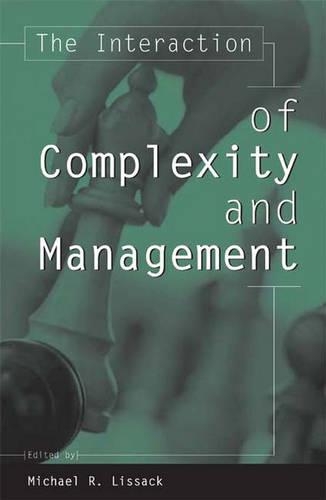
The Interaction of Complexity and Management
(Hardback)
Publishing Details
The Interaction of Complexity and Management
By (Author) Michael R. Lissack
Bloomsbury Publishing PLC
Praeger Publishers Inc
30th November 2002
United States
Classifications
Tertiary Education
Non Fiction
658.001
Physical Properties
Hardback
328
Width 156mm, Height 235mm
652g
Description
Academics and organization executives examine the newly emerging field of complexity science, and explore how its findings are already applicable to the understanding and practice of management. Complexity science seeks to understand the systems we inhabit and to find ways to apply such understanding to the management of organizations. Lissack brings together a variety of seemingly disparate disciplines within the stream of contemporary science. With a panel of important academics and executives, Lissack identifies the topics that are becoming crucial to the study of complexity science, then propose ways in which managers can extract and immediately apply what we know about them in the workplace. They show that complexity science has true scientific and mathematical underpinnings, that it offers metaphors that can help management understand and cope with uncertainty, and that what we have discovered so far is likely to produce tools that management will find ever more useful in the near future. Practical, not polemical, the book ranges widely through several disciplines, but always returns to the critical questions: What is complexity science, what is management, and how are they linked The result is an important study for executives at upper levels in the organization, organizational behavior specialists, and their colleagues in the academic community. Although books have been written to explore the potential of complexity science within the fields of management and organization studies, there is still little agreement on what complexity science really is. Schools of thought are emerging, but they differ substantially. Lissack and the contributors to this volume investigate this state of affairs-but relentlessly from the perspective of management and managers. They show that complexity science is a process. It weaves systems theory, statistical modeling, and individual and organizational learning into a new, different context, giving it the status of what they call a "meta-paradigm." Instead of prescribing it guides; it adapts instead of formalizing. Instead of defending it provides learning; instead of simplifying it complexifies, and instead of excluding it includes. Throughout the volume, Lissack and the others take a clearly pragmatic approach: if it works, it's right. (And yes, they say, it usually does work.)
Author Bio
MICHAEL R. LISSACK is Director of the Institute for the Study of Coherence and Emergence, Boston, and editor of the journal Emergence. Lissack has taught economics at Williams College, research techniques at Henley, and business ethics at the Rotterdam School of Management. He is author, coauthor, or coeditor of five previous books, including Managing Complexity in Organizations (coedited with Hugh Gunz, 2000).
